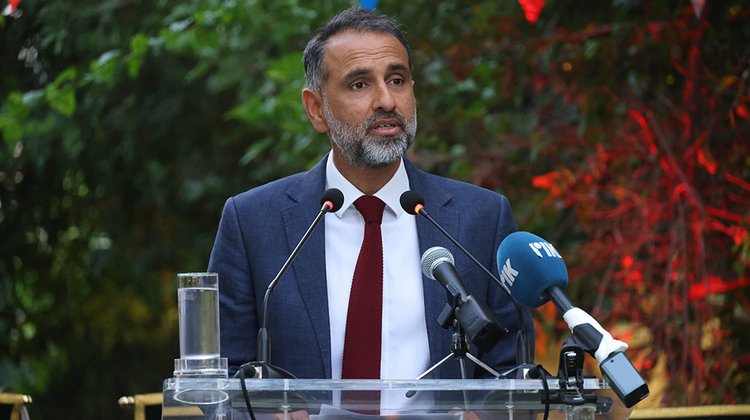Siddiq: Cyprus government agrees on Russia sanctions, challenges in occupied areas
09:32 - 25 August 2023

British High Commissioner in Cyprus Irfan Siddiq stressed the consensus within the Cyprus government to enforce sanctions against Russia, both from the previous and the present government.
He noted at the same time that while questions on shady financial practices in the Republic of Cyprus have been cleaned up, the problem was present in the Turkish-occupied areas of Cyprus.
Siddiq was replying to a question on money laundering through the Turkish-occupied areas and the lack of sanctions on Turkey from the international community, during a Round Table discussion with foreign Ambassadors in the context of the 21st World Conference of Cyprus Diaspora.
The High Commissioner noted the consensus in the Cyprus Government to enforce these sanctions, pointing out that it would be more costly to Cyprus not to do so, since there are political and moral claims for international support for the reunification of the island.
Highlighting the significant shift of individuals involved in money laundering operations moving away from the Republic, the High Commissioner lauded this development as a positive step. He noted that some of the questions about "shady financial practices" in Cyprus have now been cleaned up and it is healthier for the economy of the Republic of Cyprus not to have them.
The High Commissioner acknowledged that “the problem is now present in the North as well and that’s a challenge for us”. He added that despite the fact that they don’t recognise the "authorities in the North", referring to the Turkish-occupied areas of the Republic of Cyprus, they engaged with them to try to ensure that the consequences of these activities didn’t have negative impacts both the Republic of Cyprus and the broader region.
In a response addressing concerns about the prevailing injustice situation in Cyprus, the High Commissioner underscored the strong support of his country to find a comprehensive resolution for the Cyprus problem, with the ultimate goal of reunifying the island, based on the UN Security Council parameters for a bizonal-bicommunal federation with political equality.
However, he stressed the responsibility of the parties involved to collaborate and reach a viable solution. He expressed encouragement in witnessing the newly elected President's dedication to making the resolution of the Cyprus problem a top priority. The High Commissioner noted that despite the challenges, particularly within the buffer zone and the Pyla issue, the momentum toward resuming negotiations was a priority supported by their government.
Regarding the issue of Pyla, the High Commissioner referred to the United Nations Security Council's statement last Tuesday, asserting the importance of a solution in alignment with the agreed parameters and stressed their proactive role for that. He added that they couldn’t force Turkey to relinquish its claims and that they had to work with them to come to an agreed solution.
Members of the Security Council condemned the incidents in the buffer zone, in the village of Pyla, in Larnaca district, with assaults against UN peacekeepers, reiterating their full support for UNFICYP.
On Friday 18 August, 2023 Turkish Cypriots punched and kicked a group of international peacekeepers who obstructed crews illegally working on a road that would encroach on a U.N.-controlled buffer zone. The attack happened as peacekeepers stood in the way of work crews building a road to connect the Turkish-occupied village of Arsos with the mixed Greek Cypriot-Turkish Cypriot village of Pyla, inside the buffer zone.
Also, the British High Commissioner stressed the important role of the Cypriot Diaspora in the UK saying that “the UK Cypriot community is this vital and powerful bridge between Cyprus and the UK and plays such an important role in helping support and shape engagement between our two countries”.
He also referred to the 80,000 British residents to Cyprus and the 1,2 million British tourists to Cyprus, contributing significantly to the economy.
Siddiq underlined essential developments that took place in the previous year, notably the signing of a Memorandum of Understanding on Bilateral Strategic Co-operation as well as the agreement on Non-Military Development of the Sovereign Base Areas.
Turning challenges, Siddiq highlighted the increasing cost of fees for Cypriot students studying in the UK. He expressed the joint commitment of both governments to find a solution that would prevent a reduction in the number of Cypriot students pursuing education in the UK.
(Source: CNA)
